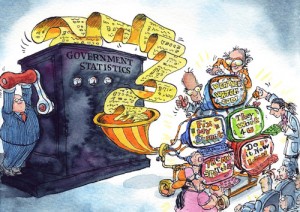
In several countries more official data are being issued in raw form so that anybody can use them. This forces bureaucrats and creative types to interact in new ways
Among America’s number-crunchers-in-chief, it is Mr Chopra whose office comes closest to the new culture of using data in a free, creative way. He thinks more government agencies should mimic the division of labour that now defines his own job at the top of the American administration: a CIO who guards stable information platforms and a CTO who cultivates data-handling talent in the open market.
Even the UK has come on board, recognizing that managing royalties and sales under the guise of cost recovery is more expensive than sharing the data.
Tom Steinberg, a British pioneer of data use, believes that what is valuable is what the market already pays for. He runs mySociety, a non-profit organisation founded in 2003 that builds simple web-based tools with self-descriptive names like “faxyourmp” and “fixmystreet”. Location is crucial to detecting patterns in public information; a map of crimes is more valuable than a list. Britain’s Ordnance Survey owns the country’s geographic data and, through an arrangement known as a “trading fund” sells them to, among others, mySociety. In 2008 economic analysis commissioned by Britain’s Treasury argued that the public value of the trading-fund information was greater than its revenue value to the crown; mapping data will be released free of charge from April.
Comments on Posts